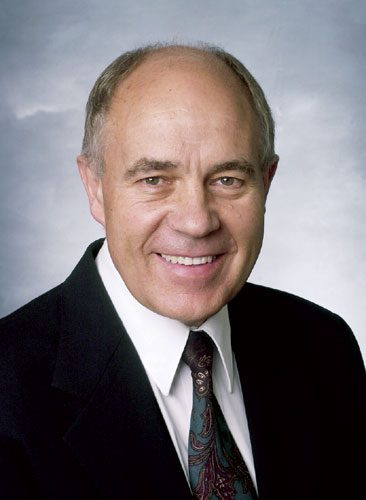Being quick to look and obey opens the doors to spiritual insight.

© 2005 Intellectual Reserve, Inc. All Rights Reserved.
In my study of the Book of Mormon, I have been especially impressed with a particular description of Mormon:
And about the time that Ammaron hid up the records unto the Lord, he came unto me [Mormon], (I being about ten years of age . . .) and Ammaron said unto me: I perceive that thou art a sober child, and art quick to observe;
Therefore, when ye are about twenty and four years old I would that ye should remember the things that ye have observed concerning this people. . . .
And behold, ye shall . . . engrave on the plates of Nephi all the things that ye have observed concerning this people.
And I, Mormon, . . . remembered the things which Ammaron commanded me. [Morm. 1:2–5; emphasis added]
Mormon, even in his youth, is described as being “quick to observe” (Morm. 1:2). As you study and learn and grow as a university student, I hope you also are becoming quick to observe. Your future success and happiness will in large measure be determined by this spiritual capacity.
As used in the scriptures, the word observe has two primary uses. One use denotes “to look” or “to see” or “to notice”—as we learn in Isa. 42:20: “Seeing many things, but thou observest not; opening the ears, but he heareth not” (emphasis added).
The second use of the word observe suggests “to obey” or “to keep”—as is evident in the Doctrine and Covenants: “But blessed are they who have kept the covenant and observed the commandment, for they shall obtain mercy” (D&C 54:6; emphasis added). Both of these fundamental elements—looking and obeying—are essential to being quick to observe.
I now want to present several examples of the lessons that can be learned when we are quick to observe.
Before attending her sacrament meetings, Sister Bednar frequently prays for the spiritual eyes to see those who have a need. Often as she observes members of the congregation, she will feel a spiritual nudge to visit with or make a phone call to a particular person. And when Sister Bednar receives such an impression, she promptly responds and obeys. Often, as soon as the “amen” is spoken in the benediction, she will talk with a teenager or hug a sister or, upon returning home, immediately make a phone call. The spiritual gift of being quick to observe has enabled her to see and to act promptly and has been a great blessing in the lives of many people.
Sister Bednar and I are acquainted with a returned missionary who had been dating a special young woman. He cared for her very much and was considering and hoping for engagement and marriage. Their relationship was developing during the time that President Hinckley counseled the women of the Church to wear only one earring in each ear.
The young man waited for the young woman to remove her extra earrings, but she did not take them out. The young man felt unsettled about her unresponsiveness to a prophet’s pleading. He ultimately stopped dating the young woman because he was looking for an eternal companion who had the courage to promptly and quietly obey the counsel of the prophet in all things and at all times. The young man was quick to observe that the young woman was not quick to observe.
Some might have difficulty with my last example. You may believe the young man was too judgmental or that basing an eternally important decision on such a supposedly minor issue is silly or fanatical. I simply invite you to consider what was actually observed in the case I just described. The issue was not earrings!
Now one final example. I have long been fascinated by the nature of the interaction between the Spirit of the Lord and Nephi found in 1 Ne. 11–14. Nephi desired to see and hear and know the things his father had seen in the vision of the tree of life (see 1 Ne. 8). The Holy Ghost assisted Nephi in learning about the nature and meaning of his father’s vision. Interestingly, the Spirit of the Lord directed Nephi to “look” 13 times as a fundamental feature of the learning process. And because Nephi was quick to observe, he beheld the tree of life (1 Ne. 11:8); the mother of the Savior (1 Ne. 11:20); the rod of iron (1 Ne. 11:25); and the Lamb of God, the Son of the Eternal Father (1 Ne. 11:21).
Nephi would not have seen what he desired to see, he would not have known what he needed to know, and he could not have done what he ultimately needed to do if he had not been quick to observe. That same truth applies to you and to me.
Being Quick to Observe Is Vital Today
Being quick to observe is an antecedent to and is linked with the spiritual gift of discernment, which is a light of protection and direction in a world that grows increasingly dark. We can only hope to obtain that supernal gift of discernment if we are quick to observe—if we both look and obey.
President George Q. Cannon, who served as a counselor to four presidents of the Church, taught powerfully about the gift of discernment:
The gift of discerning of spirits not only gives men and women who have it the power to discern the spirit with which others may be possessed or influenced, but it gives them the power to discern the spirit which influences themselves. They are able to detect a false spirit and also to know when the Spirit of God reigns within them. In private life this gift is of great importance to the Latter-day Saints. Possessing and exercising this gift they will not allow any evil influence to enter into their hearts or to prompt them in their thoughts, their words or their acts. They will repel it; and if perchance such a spirit should get possession of them, as soon as they witness its effects they will expel it or, in other words, refuse to be led or prompted by it. [Gospel Truth: Discourses and Writings of President George Q. Cannon, comp. Jerreld L. Newquist (Salt Lake City: Deseret Book, 1974), 1:198–99]
President Stephen L Richards, who served as a counselor to President David O. McKay, has provided additional instruction about discernment:
The gift of discernment [embodies] the power to discriminate . . . between right and wrong. I believe that this gift when highly developed arises largely out of an acute sensitivity to impressions—spiritual impressions, if you will—to read under the surface as it were, to detect hidden evil, and more importantly to find the good that may be concealed. The highest type of discernment is that which perceives in others and uncovers for them their better natures, the good inherent within them. . . .
. . . Every member in the restored Church of Christ could have this gift if he willed to do so. He could not be deceived with the sophistries of the world. . . . Even the inexperienced would recognize false teachings. . . . We ought to be grateful every day of our lives for this sense which keeps alive a conscience which constantly alerts us to the dangers inherent in wrongdoers and sin. [Conference Report, April 1950, pp. 162–63; emphasis added]
As we integrate these teachings, we learn that the gift of discernment operates basically in four major ways.
First, as we “read under the surface,” discernment helps us detect hidden error and evil in others. Second, and more important, it helps us detect hidden errors and evil in ourselves. Third, it helps us find and bring forth the good that may be concealed in others. And fourth, it helps us find and bring forth the good that may be concealed in us.
These teachings become even more important in light of a specific element of Lehi’s vision. Various groups of people were “pressing forward, that they might obtain the path which led unto the tree [of life]” (1 Ne. 8:21). The strait and narrow path came along by the rod of iron, even to the tree (see 1 Ne. 8:20). The mists of darkness described in the vision represent the temptations of the devil, which blind the eyes of the children of men and lead them into broad roads so that they are lost (see 1 Ne. 12:17).
There arose . . . an exceedingly great mist of darkness, insomuch that they who had commenced in the path did lose their way, that they wandered off and were lost. [1 Ne. 8:23]
We can press forward safely and successfully through the mist of darkness and have a clear sense of spiritual direction.
Discernment is so much more than recognizing right from wrong. It helps us to distinguish the relevant from the irrelevant, the important from the unimportant, and the necessary from that which is merely nice. The gift of discernment opens to us vistas that stretch far beyond what can be seen with natural eyes or heard with natural ears. Discerning is seeing with spiritual eyes and feeling with the heart—seeing and feeling the falsehood of an idea or the goodness in another person. Discerning is hearing with spiritual ears and feeling with the heart—hearing and feeling the unspoken concern in a statement or the truthfulness of a testimony or doctrine.
I frequently have heard President Boyd K. Packer counsel members and priesthood leaders: “If all you know is what you see with your natural eyes and hear with your natural ears, then you will not know very much.”
Observing and discerning also enable us to assist others who are seeking to obtain the path and who desire to press forward with steadfastness in Christ. Blessed with these spiritual gifts, we will not lose our way; we will not wander off; we will not be lost. And we can only hope to obtain the supernal gift of discernment and its light of protection and direction if we are quick to observe. As Alma taught his son Helaman, “See that ye take care of these sacred things, yea, see that ye look to God and live” (Alma 37:47). 4
Elder David A. Bednar is a member of the Quorum of the Twelve Apostles of the Church of Jesus Christ. He gave the devotional address from which this article is adapted on May 10, 2005. The full text is available at more.byu.edu/bednar.










